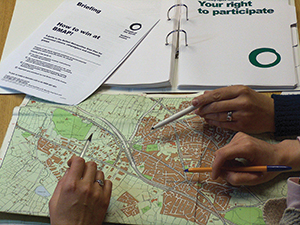A single planning policy

Following the release of the long awaited Strategic Planning Policy Statement agendaNi takes a look at what changes this single policy document will make to planning in Northern Ireland.
The Department of Environment’s new Strategic Planning Policy Statement (SPPS) is in essence, a go to guide for everyone involved in Northern Ireland’s planning system. It consolidates all of Northern Ireland’s planning policy into one single statement and provides policy on key issues such as town centers and rural developments, building in the countryside, creating and enhancing shared space, tourism, telecommunications and housing.
The provisions of the SPPS apply to the whole of Northern Ireland, must be taken into account in development of local area plans and are material to all decisions on individual planning applications and appeals but just what has changed and how will this document affect future planning applications?
Creation
When creating this single planning policy document, the department’s primary focus was not on overhauling existing planning policy, rather, consolidating it all into one manageable document that maintained a focus on ensuring that planning remained fundamentally about creating places where communities flourish both now and in the future. Unsurprisingly, given its scope, there was widespread interest in the SPPS and a lively and constructive two way debate took place on the appropriate planning policy context for the reformed two-tier planning system over a period of 12 weeks with the department receiving over 700 consultation responses.
Following this consultation, the department has managed to produce a shorter, simpler, strategic planning policy framework that provides clarity and certainty for councils, planners, communities, developers, investors and other stakeholders.
Local flexibility
The SPPS is an enabling document that, under the new two-tier planning system, gives councils flexibility to bring forward detailed operational planning policies through their local development plans, tailored to local circumstances. It sets out a new purpose of planning and clarifies that furthering sustainable development is at the heart of the planning system. The strategy reinforces the planning system’s focus on operating in the public interest of local communities and the region as a whole by encompassing the present as well as long term future needs of society.
Planning principles
The planning principles of improving health and well-being; creating and enhancing shared space; supporting good design and positive place-making, have all been retained. In addition, two new core planning principles have been included in the statement. These are: ‘supporting sustainable economic growth, and ‘preserving and improving the built and natural environment.’ These additions give emphasis to planning matters set out elsewhere in the strategy and help to ensure an appropriate balance in relation to social, economic and environmental considerations.
In the draft SPPS, there were four core planning principles that were process orientated but these are now reflected in a new section of the document titled ‘The Planning Process: Implementation.’

Subject policies
In finalising the SPPS, the department has also restructured how the subject policies are presented. Subject policies are now set out with reference to regional strategic objectives, regional strategic policy and implementation. This is designed to make the department’s strategic policy approach clearer.
The first of these subject policies is renewable energy. Having taken into account all the comments received on the draft SPPS and following additional engagement with the committee and others in relation to this particular policy area, there is a greater acknowledgement of the contribution of the renewable energy industry in the SPPS. The strategy recognises that the renewable energy industry makes a significant contribution towards achieving sustainable development, as a provider of jobs and investment across the region, and also acknowledges the wider government policy support for the use of renewable energy sources.
The policy includes reference to the Department of Enterprise Trade and Investment’s strategic energy framework. Furthermore, it seeks to more closely reflect PPS 18 by making it clear that developments that generate energy from renewable resources will be permitted where the proposal and any associated buildings and infrastructure, will not result in unacceptable adverse impacts on interests of acknowledged importance.
In relation to how the wider environmental, economic and social benefits are to be assessed, the strategy clarifies that planning authorities will give such considerations ‘appropriate’ weight in determining whether planning permission should be granted. It is also considered appropriate that a cautious approach in designated landscapes, as per the current best practice guidance, is reflected in strategic policy and therefore this approach has been carried forward.
Where appropriate, the policy will also takes into account the recommendations of the report of the Environment Committee’s Wind Energy Inquiry. In relation to development in the countryside, the SPPS now reflects the policy approach contained in PPS 21. It provides additional clarity on the range of development types considered, in principle, to be acceptable in the countryside, including infill opportunities, replacement dwellings and farm dwellings.
Two-tier planning system
The strategy also provides for a considerable degree of flexibility for councils to reflect differences within the region. It enables councils to bring forward bespoke local policies for the development of the rural parts of their own planning areas through their Local Development Plans which will address their specific economic, social and environmental circumstances.
Such policies reflect the provisions of the strategy and may involve recognising areas that are particularly sensitive to change and areas which have lower sensitivities and thus provide opportunities to accommodate sustainable development. Subject to some minor revisions, the strategy retains the overall town centers first approach for the location of future retail.
Providing certainty
The SPPS also reaffirms the department’s position that there should be a presumption against the exploitation of unconventional hydrocarbon extraction until there is sufficient and robust evidence on all environmental impacts. Speaking about the release of the strategy at the Northern Ireland Planning Forum, Environment Minster Mark H. Durkan admitted that whilst it had taken longer than he would have hoped to finally “get it out and over the line,” he is pleased that the document provides ‘certainty’ both for those making planning applications and those tasked with making decisions about the applications.





